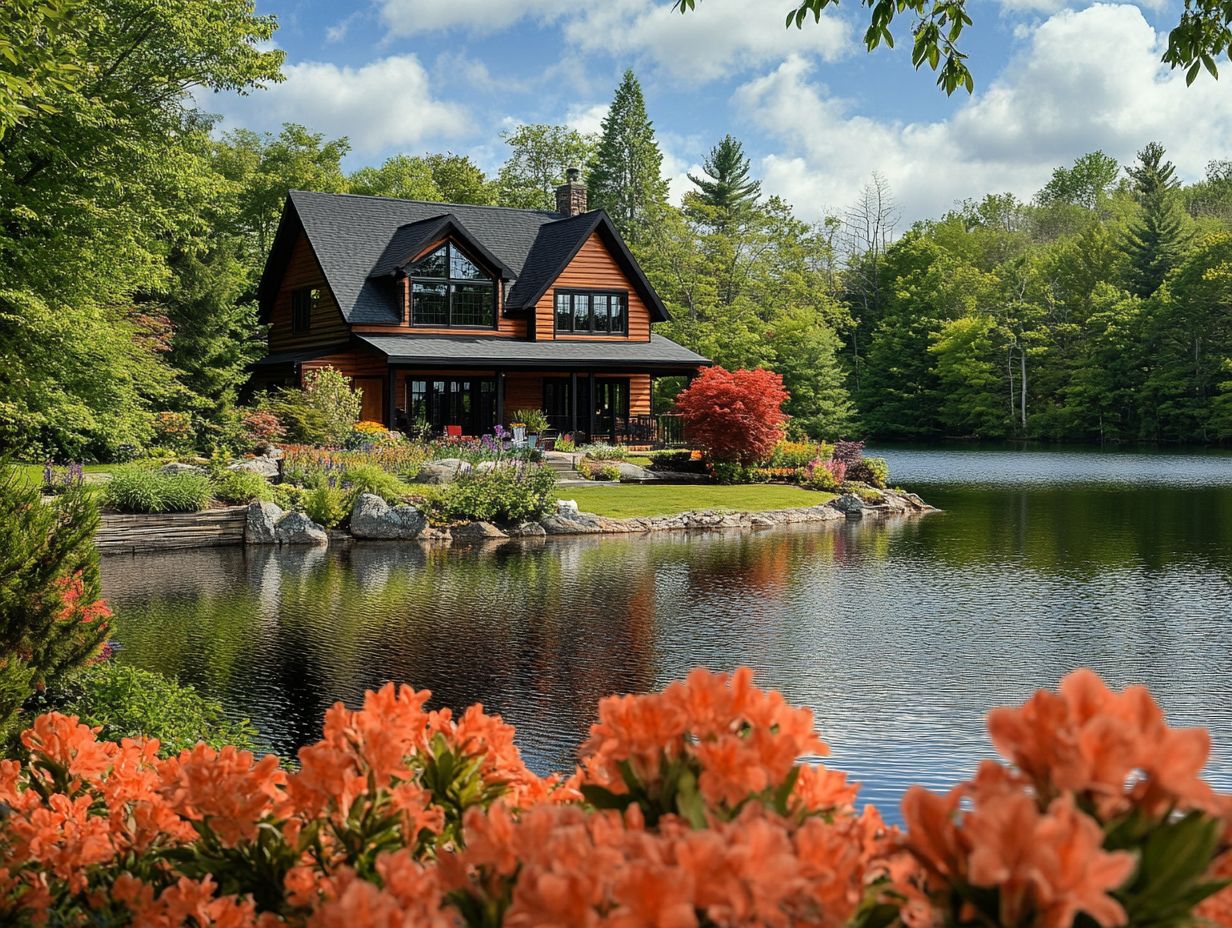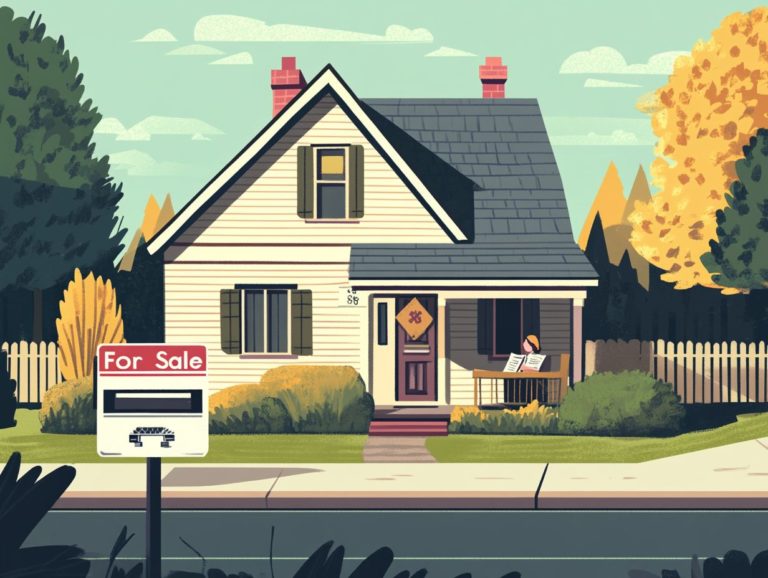Understanding Home Insurance for Vacation Properties
Are you considering investing in a vacation property? The excitement of owning a getaway is real, but understanding the unique insurance requirements is essential.
Vacation properties come with risks, like potential damage during off-seasons and liability concerns with renters. This article covers the essentials of vacation property insurance, including coverage options, factors affecting rates, and tips for choosing the right policy.
With this knowledge, you can protect your investment and enjoy your home away from home!
Contents
- Key Takeaways:
- Why Vacation Properties Need Special Coverage
- Types of Coverage for Vacation Properties
- Factors that Affect Vacation Property Insurance Rates
- How to Choose the Right Vacation Property Insurance
- Frequently Asked Questions
- What is considered a vacation property?
- Do I need separate insurance for my vacation property?
- What does vacation home insurance cover?
- How is the cost of vacation home insurance determined?
- What is the difference between vacation home insurance and regular homeowners insurance?
- Can I rent out my vacation property and still have insurance coverage?
Key Takeaways:

- Vacation properties require special insurance due to unique risks, like being unoccupied for long periods and the risk of losing rental income.
- Dwelling and liability coverage protect the property and legal claims.
- Factors like location and security affect vacation property insurance costs.
- Assess your coverage needs and compare policies to find the best fit!
What is Vacation Property Insurance?
Vacation Property Insurance offers essential protection for your second home or vacation property, covering various risks, including fire damage, water damage, and liability for any accidents that may occur on your premises.
This specialized insurance is tailored to meet the unique needs of vacation homeowners, ensuring your property remains secure whether it s occupied or sitting empty.
Unlike standard homeowners insurance, this policy addresses specific perils associated with both short-term and long-term rentals, giving you peace of mind while you manage your rental activities.
Traditional homeowners insurance might only cover general wear and tear, but vacation property insurance accounts for the higher risks of having guests who might inadvertently cause damage.
It also includes coverage for theft, vandalism, and natural disasters, ensuring that you re protected from multiple angles.
With the growing popularity of platforms that facilitate short-term stays, having this insurance isn t just a smart move; it s a strategic necessity that can help attract renters who want reassurance that their stay is secure.
Ultimately, this targeted policy helps you protect your investment and potentially boost your rental income by mitigating risks.
Why Vacation Properties Need Special Coverage
Vacation properties demand a distinct type of coverage because they carry unique risks and are utilized differently than primary residences.
While homeowners insurance generally protects personal homes, vacation homes or rentals introduce additional liabilities and exposures that require specialized insurance policies.
These properties can encounter specific challenges, including a higher risk of damages from fire, water, or vandalism, particularly during periods of vacancy.
If you’re considering short-term rentals through platforms like Airbnb, think about liability coverage and extra protection for the risk of losing rental income.
Unique Risks and Considerations
Owning a vacation home brings a distinct set of risks and considerations that differ from managing a primary residence, especially regarding liability coverage and what perils are covered.
You might underestimate the implications of having guests on your property, which exposes you to various liabilities that aren’t typically a concern for traditional long-term rentals. The potential for injuries to occur on your premises could lead to expensive legal disputes, while incidents like accidental property damage might leave you vulnerable if you lack adequate coverage.
With fluctuating rental patterns, you face a dynamic risk environment that demands flexible insurance solutions tailored to times of high occupancy. Understanding these varied risks not only aids in selecting the right insurance but also ensures you enjoy peace of mind throughout the rental process.
Staying informed and proactive about your unique insurance needs is essential for any vacation homeowner.
Types of Coverage for Vacation Properties
When considering vacation properties, it s crucial for you to grasp the various types of coverage that will safeguard your investment and offer peace of mind.
There are insurance policies tailored specifically for vacation property owners, such as dwelling coverage, which protects the physical structure of your property, and liability coverage, which shields you against legal claims from guests or tenants.
You can also include additional coverage options that address various risks, like natural disasters or loss of rental income. This creates a comprehensive safety net for you as a property owner in the dynamic rental landscape.
Dwelling Coverage

Dwelling coverage is an essential aspect of any vacation property insurance policy. It safeguards the physical structure of your vacation home from various risks. This coverage typically protects against damages from fire, water incidents, and other specific perils that could lead to substantial financial loss.
It goes beyond what you d find in a standard homeowners policy, specifically addressing the unique needs of properties that may be left unoccupied for long stretches or rented out. This ensures your investment remains secure.
Vacation homes often face greater risks from weather-related damages, such as storms or flooding, which might not be as critical for your primary residence. The coverage applies to structural elements like roofs, walls, and built-in fixtures, offering comprehensive protection against vandalism or theft issues more likely to affect homes that aren t regularly inhabited.
As a vacation homeowner, you should know that policies can vary in terms of deductibles and limits, reflecting the distinct usage of these properties compared to standard homeowners insurance. Understanding these nuances is vital for protecting an investment that carries significant personal and financial stakes.
Liability Coverage
Liability coverage is an essential component of vacation property insurance, offering you financial protection against claims arising from injuries or damages that may occur on your property.
For vacation homeowners like you, this means shielding yourself from potential lawsuits or medical expenses that could result from incidents involving guests or tenants. Insurance companies often have different policies, so it s crucial to understand the limits of your personal liability coverage and to consider additional options for complete protection.
This type of coverage takes on heightened importance when guests might inadvertently injure themselves or damage the property, which can lead to significant financial fallout.
You need to evaluate your unique risk factors, including the activities available at your vacation home and its location, as these elements can influence the likelihood of accidents.
Carefully examining the specific terms of various insurance plans can uncover key differences in coverage levels. In some instances, it may be wise to explore supplementary policies designed for high-traffic rental situations, maximizing your safety net and ensuring peace of mind during your guests’ stay.
Factors that Affect Vacation Property Insurance Rates
Several factors significantly influence vacation property insurance rates, making it crucial for homeowners to grasp how these elements impact their insurance costs.
The location of your vacation property is paramount; properties situated in areas prone to natural disasters, such as floods or hurricanes, typically incur higher premium costs.
Furthermore, the type of property you own whether it’s a beachfront retreat or a cozy cabin in the woods along with the security measures you implement, such as a home security system, can also play a pivotal role in determining the overall cost of your insurance policy.
Take control of your vacation property insurance today and ensure your investment is fully protected!
Location and Property Type
The location and type of property are critical factors impacting vacation property insurance costs. These elements directly influence the associated risks.
If you own a home in flood-prone or earthquake-prone areas, you ll likely need specialized flood or earthquake insurance.
Similarly, whether your vacation home is a beachfront oasis, a cozy mountain retreat, or an urban apartment can affect the coverage required and the rates offered by insurance providers.
For example, properties near the coast often face higher rates due to the potential risks of hurricanes or severe storms. Comprehensive windstorm coverage becomes a necessity.
Conversely, a mountain retreat may require avalanche or extensive liability coverage because of the inherent risks tied to winter sports. Urban apartments may need renter’s insurance or condominium coverage, considering local crime rates and the building’s safety features.
Understanding how these variables relate to specific insurance requirements helps you select policies tailored to your needs. This ensures adequate protection without breaking the bank.
Security Measures
Implementing effective security measures can significantly influence your vacation property insurance costs. These measures play a vital role in reducing risks for empty homes.
By installing a home security system, you enhance your property’s safety and may enjoy lower premium costs. Insurance companies often offer discounts for homes equipped with advanced security features.
Engaging with an insurance expert helps you identify the most effective security practices and their potential impact on your insurance rates.
You can further reduce theft risks by installing smart locks, motion detectors, and surveillance cameras. These proactive steps make a strong case to insurers, showing your commitment to safeguarding your home.
As a result, you often see favorable adjustments to coverage policies or premium amounts. Collaborating with an insurance expert opens doors to potential savings and ensures you understand various liability coverage options influenced by your security measures.
How to Choose the Right Vacation Property Insurance

Choosing the right vacation property insurance requires a thoughtful examination of your individual coverage needs and a meticulous comparison of various insurance policies available in the market.
Identify the risks linked to your vacation home. Consider whether it’s primarily rented out short-term through platforms like Airbnb or reserved for family retreats.
Working with an insurance expert offers invaluable insights into the best options tailored for you. This ensures you select a policy that effectively safeguards against potential liabilities and damages.
Assessing Your Coverage Needs
Assessing your coverage needs is crucial for determining the appropriate vacation property insurance tailored to your unique situation. This ensures you are well-protected.
When evaluating these needs, consider how often you rent out your property and the types of guests you attract. For example, a vacation home that hosts large family gatherings will have different insurance requirements than one rented primarily by couples.
Factors such as the local climate, natural disaster risks, and valuable furnishings can influence the levels of protection you require.
By carefully analyzing these elements, you can pinpoint essential coverages, including:
- Comprehensive liability insurance (This covers legal costs if someone gets hurt on your property)
- Structural damage support for your dwelling
- Enhanced protections for personal property that may be at risk during tenant stays
Comparing Policies and Providers
Comparar p lizas y proveedores es crucial. Te ayuda a descubrir el mejor seguro para propiedades de vacaciones.
Este proceso te permite evaluar tus opciones basado en la cobertura, los costos de las primas y tus necesidades espec ficas.
En un mercado cada vez m s competitivo, entender las sutilezas de los diferentes planes de seguro es esencial.
Debes analizar los beneficios nicos que cada proveedor ofrece. Especialmente cu n bien sus p lizas protegen contra riesgos espec ficos relevantes para el tipo y la ubicaci n de tu propiedad.
Evaluar los costos de las primas junto con la integridad de la cobertura es vital. A veces, las primas m s bajas pueden comprometer protecciones esenciales.
Tambi n es recomendable profundizar en las experiencias de los clientes. Estas perspectivas pueden revelar la fiabilidad y la capacidad de respuesta de los aseguradores durante los procesos de reclamaci n.
Aseg rate de que tengas tranquilidad cuando m s lo necesitas. En ltima instancia, una investigaci n exhaustiva es tu mejor aliado para seleccionar una p liza que cumpla con tus requisitos individuales para propiedades de vacaciones.
Esto te permite equilibrar la rentabilidad con una protecci n integral.
Frequently Asked Questions
What is considered a vacation property?
A vacation property is any home or dwelling used as a secondary residence or for recreational purposes, such as a vacation home, cabin, or beach house. It is not the primary residence of the homeowner and is usually only occupied for a portion of the year.
Do I need separate insurance for my vacation property?

Yes, you will need a separate insurance policy for your vacation property. Your regular homeowners insurance policy most likely does not cover secondary residences or properties that are not occupied year-round.
What does vacation home insurance cover?
Vacation home insurance typically covers the physical structure of the property, personal belongings inside the property, liability for injuries or property damage, and loss of rental income due to covered damages.
How is the cost of vacation home insurance determined?
Several factors can affect the cost of your vacation home insurance, including the location, size and value of the property, the type of coverage you choose, and any additional features or amenities that may increase the risk of potential damages.
What is the difference between vacation home insurance and regular homeowners insurance?
Vacation home insurance is specifically designed to cover properties that are not the primary residence of the homeowner and are often not occupied year-round. Regular homeowners insurance is intended for primary residences and may not provide adequate coverage for a vacation property.
Can I rent out my vacation property and still have insurance coverage?
Yes, you can rent out your vacation property and still have insurance coverage, but you may need to purchase additional coverage, such as rental dwelling insurance, to protect against any damages or liabilities that may occur while the property is being rented out.
Start comparing vacation property insurance today to secure your investment!




